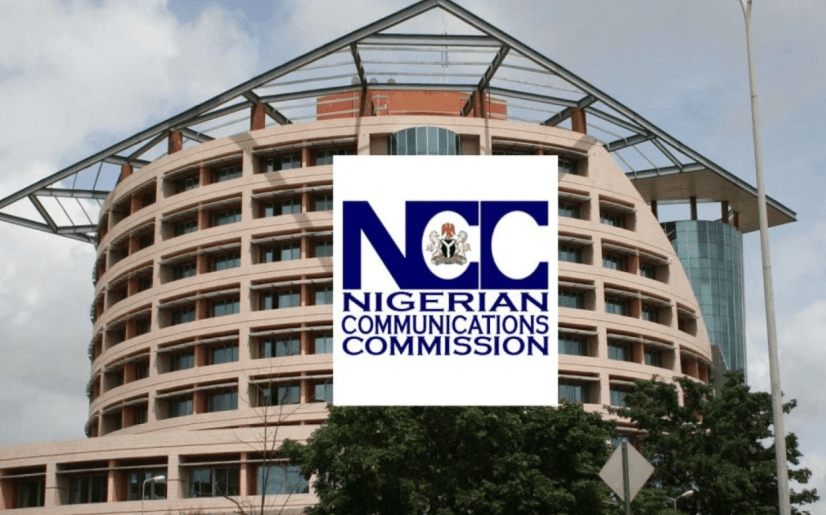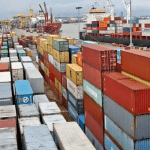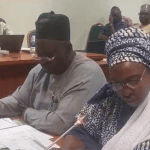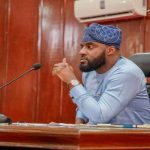The Nigerian Communications Commission (NCC) has remitted N463 billion into the Federal Government’s Consolidated Revenue Fund (CRF) in the last five years.
This was disclosed by the Executive Vice Chairman of the Commission, Prof. Umar Danbatta when he led the management team of NCC on a visit to the Permanent Secretary, Ministry of Communications and Digital Economy, Dr. William Alo.
Danbatta, who briefed the Permanent Secretary on the situation of the industry following his appointment, stated that NCC remained a significant contributor to the country’s Gross Domestic Product (GDP).
[wonderplugin_video iframe=”https://youtu.be/aI276kMPlFo” lightbox=0 lightboxsize=1 lightboxwidth=960 lightboxheight=540 autoopen=0 autoopendelay=0 autoclose=0 lightboxtitle=”” lightboxgroup=”” lightboxshownavigation=0 showimage=”” lightboxoptions=”” videowidth=600 videoheight=400 keepaspectratio=1 autoplay=0 loop=0 videocss=”position:relative;display:block;background-color:#000;overflow:hidden;max-width:100%;margin:0 auto;” playbutton=”https://www.tvcnews.tv/wp-content/plugins/wonderplugin-video-embed/engine/playvideo-64-64-0.png”]
He explained that the 3G and 4G Base Transceiver Stations (BTS) in the country have increased from less than 30,000 in 2015 to 53,460 while 7 VSAT gateway earth stations have been licensed to boost broadband penetration in the country.
He stated that the industry’s GDP contributions had increased from 8.5 percent in the fourth quarter (Q4) of 2015 to 12.61 percent in the fourth quarter (Q4) of 2021, while the telecoms sector had also garnered over $2 billion in foreign direct investment during the same period.
Danbatta also stated that as of June of this year, the country had more than 84 million Internet subscribers also did not rule out the prospect of a 5G rollout on August 24, said five instruments were already in place but needed to be updated to reflect the present realities of 5G deployment.
The items include regulations that have been type-approved, directives on Nigerian short code operation, and directives on technical requirements for the deployment of communications infrastructures.
Others include the rules for promotions and marketing as well as the consumer code of practice rules.
One of the realities of 5G rollout, according to the NCC chief, is that Mobile Network Operators (MNOs) will need to make significant infrastructure investments, especially given the anticipated technological breakthroughs in the sector.
The Nigerian Communications Commission (NCC) has remitted N463 billion into the Federal Government’s Consolidated Revenue Fund (CRF) in the last five years.
This was disclosed by the Executive Vice Chairman of the Commission, Prof. Umar Danbatta when he led the management team of NCC on a visit to the Permanent Secretary, Ministry of Communications and Digital Economy, Dr. William Alo.
Danbatta, who briefed the Permanent Secretary on the situation of the industry following his appointment, stated that NCC remained a significant contributor to the country’s Gross Domestic Product (GDP).
[wonderplugin_video iframe=”https://youtu.be/aI276kMPlFo” lightbox=0 lightboxsize=1 lightboxwidth=960 lightboxheight=540 autoopen=0 autoopendelay=0 autoclose=0 lightboxtitle=”” lightboxgroup=”” lightboxshownavigation=0 showimage=”” lightboxoptions=”” videowidth=600 videoheight=400 keepaspectratio=1 autoplay=0 loop=0 videocss=”position:relative;display:block;background-color:#000;overflow:hidden;max-width:100%;margin:0 auto;” playbutton=”https://www.tvcnews.tv/wp-content/plugins/wonderplugin-video-embed/engine/playvideo-64-64-0.png”]
He explained that the 3G and 4G Base Transceiver Stations (BTS) in the country have increased from less than 30,000 in 2015 to 53,460 while 7 VSAT gateway earth stations have been licensed to boost broadband penetration in the country.
He stated that the industry’s GDP contributions had increased from 8.5 percent in the fourth quarter (Q4) of 2015 to 12.61 percent in the fourth quarter (Q4) of 2021, while the telecoms sector had also garnered over $2 billion in foreign direct investment during the same period.
Danbatta also stated that as of June of this year, the country had more than 84 million Internet subscribers also did not rule out the prospect of a 5G rollout on August 24, said five instruments were already in place but needed to be updated to reflect the present realities of 5G deployment.
The items include regulations that have been type-approved, directives on Nigerian short code operation, and directives on technical requirements for the deployment of communications infrastructures.
Others include the rules for promotions and marketing as well as the consumer code of practice rules.
One of the realities of 5G rollout, according to the NCC chief, is that Mobile Network Operators (MNOs) will need to make significant infrastructure investments, especially given the anticipated technological breakthroughs in the sector.
The Nigerian Communications Commission (NCC) has remitted N463 billion into the Federal Government’s Consolidated Revenue Fund (CRF) in the last five years.
This was disclosed by the Executive Vice Chairman of the Commission, Prof. Umar Danbatta when he led the management team of NCC on a visit to the Permanent Secretary, Ministry of Communications and Digital Economy, Dr. William Alo.
Danbatta, who briefed the Permanent Secretary on the situation of the industry following his appointment, stated that NCC remained a significant contributor to the country’s Gross Domestic Product (GDP).
[wonderplugin_video iframe=”https://youtu.be/aI276kMPlFo” lightbox=0 lightboxsize=1 lightboxwidth=960 lightboxheight=540 autoopen=0 autoopendelay=0 autoclose=0 lightboxtitle=”” lightboxgroup=”” lightboxshownavigation=0 showimage=”” lightboxoptions=”” videowidth=600 videoheight=400 keepaspectratio=1 autoplay=0 loop=0 videocss=”position:relative;display:block;background-color:#000;overflow:hidden;max-width:100%;margin:0 auto;” playbutton=”https://www.tvcnews.tv/wp-content/plugins/wonderplugin-video-embed/engine/playvideo-64-64-0.png”]
He explained that the 3G and 4G Base Transceiver Stations (BTS) in the country have increased from less than 30,000 in 2015 to 53,460 while 7 VSAT gateway earth stations have been licensed to boost broadband penetration in the country.
He stated that the industry’s GDP contributions had increased from 8.5 percent in the fourth quarter (Q4) of 2015 to 12.61 percent in the fourth quarter (Q4) of 2021, while the telecoms sector had also garnered over $2 billion in foreign direct investment during the same period.
Danbatta also stated that as of June of this year, the country had more than 84 million Internet subscribers also did not rule out the prospect of a 5G rollout on August 24, said five instruments were already in place but needed to be updated to reflect the present realities of 5G deployment.
The items include regulations that have been type-approved, directives on Nigerian short code operation, and directives on technical requirements for the deployment of communications infrastructures.
Others include the rules for promotions and marketing as well as the consumer code of practice rules.
One of the realities of 5G rollout, according to the NCC chief, is that Mobile Network Operators (MNOs) will need to make significant infrastructure investments, especially given the anticipated technological breakthroughs in the sector.
The Nigerian Communications Commission (NCC) has remitted N463 billion into the Federal Government’s Consolidated Revenue Fund (CRF) in the last five years.
This was disclosed by the Executive Vice Chairman of the Commission, Prof. Umar Danbatta when he led the management team of NCC on a visit to the Permanent Secretary, Ministry of Communications and Digital Economy, Dr. William Alo.
Danbatta, who briefed the Permanent Secretary on the situation of the industry following his appointment, stated that NCC remained a significant contributor to the country’s Gross Domestic Product (GDP).
[wonderplugin_video iframe=”https://youtu.be/aI276kMPlFo” lightbox=0 lightboxsize=1 lightboxwidth=960 lightboxheight=540 autoopen=0 autoopendelay=0 autoclose=0 lightboxtitle=”” lightboxgroup=”” lightboxshownavigation=0 showimage=”” lightboxoptions=”” videowidth=600 videoheight=400 keepaspectratio=1 autoplay=0 loop=0 videocss=”position:relative;display:block;background-color:#000;overflow:hidden;max-width:100%;margin:0 auto;” playbutton=”https://www.tvcnews.tv/wp-content/plugins/wonderplugin-video-embed/engine/playvideo-64-64-0.png”]
He explained that the 3G and 4G Base Transceiver Stations (BTS) in the country have increased from less than 30,000 in 2015 to 53,460 while 7 VSAT gateway earth stations have been licensed to boost broadband penetration in the country.
He stated that the industry’s GDP contributions had increased from 8.5 percent in the fourth quarter (Q4) of 2015 to 12.61 percent in the fourth quarter (Q4) of 2021, while the telecoms sector had also garnered over $2 billion in foreign direct investment during the same period.
Danbatta also stated that as of June of this year, the country had more than 84 million Internet subscribers also did not rule out the prospect of a 5G rollout on August 24, said five instruments were already in place but needed to be updated to reflect the present realities of 5G deployment.
The items include regulations that have been type-approved, directives on Nigerian short code operation, and directives on technical requirements for the deployment of communications infrastructures.
Others include the rules for promotions and marketing as well as the consumer code of practice rules.
One of the realities of 5G rollout, according to the NCC chief, is that Mobile Network Operators (MNOs) will need to make significant infrastructure investments, especially given the anticipated technological breakthroughs in the sector.
The Nigerian Communications Commission (NCC) has remitted N463 billion into the Federal Government’s Consolidated Revenue Fund (CRF) in the last five years.
This was disclosed by the Executive Vice Chairman of the Commission, Prof. Umar Danbatta when he led the management team of NCC on a visit to the Permanent Secretary, Ministry of Communications and Digital Economy, Dr. William Alo.
Danbatta, who briefed the Permanent Secretary on the situation of the industry following his appointment, stated that NCC remained a significant contributor to the country’s Gross Domestic Product (GDP).
[wonderplugin_video iframe=”https://youtu.be/aI276kMPlFo” lightbox=0 lightboxsize=1 lightboxwidth=960 lightboxheight=540 autoopen=0 autoopendelay=0 autoclose=0 lightboxtitle=”” lightboxgroup=”” lightboxshownavigation=0 showimage=”” lightboxoptions=”” videowidth=600 videoheight=400 keepaspectratio=1 autoplay=0 loop=0 videocss=”position:relative;display:block;background-color:#000;overflow:hidden;max-width:100%;margin:0 auto;” playbutton=”https://www.tvcnews.tv/wp-content/plugins/wonderplugin-video-embed/engine/playvideo-64-64-0.png”]
He explained that the 3G and 4G Base Transceiver Stations (BTS) in the country have increased from less than 30,000 in 2015 to 53,460 while 7 VSAT gateway earth stations have been licensed to boost broadband penetration in the country.
He stated that the industry’s GDP contributions had increased from 8.5 percent in the fourth quarter (Q4) of 2015 to 12.61 percent in the fourth quarter (Q4) of 2021, while the telecoms sector had also garnered over $2 billion in foreign direct investment during the same period.
Danbatta also stated that as of June of this year, the country had more than 84 million Internet subscribers also did not rule out the prospect of a 5G rollout on August 24, said five instruments were already in place but needed to be updated to reflect the present realities of 5G deployment.
The items include regulations that have been type-approved, directives on Nigerian short code operation, and directives on technical requirements for the deployment of communications infrastructures.
Others include the rules for promotions and marketing as well as the consumer code of practice rules.
One of the realities of 5G rollout, according to the NCC chief, is that Mobile Network Operators (MNOs) will need to make significant infrastructure investments, especially given the anticipated technological breakthroughs in the sector.
The Nigerian Communications Commission (NCC) has remitted N463 billion into the Federal Government’s Consolidated Revenue Fund (CRF) in the last five years.
This was disclosed by the Executive Vice Chairman of the Commission, Prof. Umar Danbatta when he led the management team of NCC on a visit to the Permanent Secretary, Ministry of Communications and Digital Economy, Dr. William Alo.
Danbatta, who briefed the Permanent Secretary on the situation of the industry following his appointment, stated that NCC remained a significant contributor to the country’s Gross Domestic Product (GDP).
[wonderplugin_video iframe=”https://youtu.be/aI276kMPlFo” lightbox=0 lightboxsize=1 lightboxwidth=960 lightboxheight=540 autoopen=0 autoopendelay=0 autoclose=0 lightboxtitle=”” lightboxgroup=”” lightboxshownavigation=0 showimage=”” lightboxoptions=”” videowidth=600 videoheight=400 keepaspectratio=1 autoplay=0 loop=0 videocss=”position:relative;display:block;background-color:#000;overflow:hidden;max-width:100%;margin:0 auto;” playbutton=”https://www.tvcnews.tv/wp-content/plugins/wonderplugin-video-embed/engine/playvideo-64-64-0.png”]
He explained that the 3G and 4G Base Transceiver Stations (BTS) in the country have increased from less than 30,000 in 2015 to 53,460 while 7 VSAT gateway earth stations have been licensed to boost broadband penetration in the country.
He stated that the industry’s GDP contributions had increased from 8.5 percent in the fourth quarter (Q4) of 2015 to 12.61 percent in the fourth quarter (Q4) of 2021, while the telecoms sector had also garnered over $2 billion in foreign direct investment during the same period.
Danbatta also stated that as of June of this year, the country had more than 84 million Internet subscribers also did not rule out the prospect of a 5G rollout on August 24, said five instruments were already in place but needed to be updated to reflect the present realities of 5G deployment.
The items include regulations that have been type-approved, directives on Nigerian short code operation, and directives on technical requirements for the deployment of communications infrastructures.
Others include the rules for promotions and marketing as well as the consumer code of practice rules.
One of the realities of 5G rollout, according to the NCC chief, is that Mobile Network Operators (MNOs) will need to make significant infrastructure investments, especially given the anticipated technological breakthroughs in the sector.
The Nigerian Communications Commission (NCC) has remitted N463 billion into the Federal Government’s Consolidated Revenue Fund (CRF) in the last five years.
This was disclosed by the Executive Vice Chairman of the Commission, Prof. Umar Danbatta when he led the management team of NCC on a visit to the Permanent Secretary, Ministry of Communications and Digital Economy, Dr. William Alo.
Danbatta, who briefed the Permanent Secretary on the situation of the industry following his appointment, stated that NCC remained a significant contributor to the country’s Gross Domestic Product (GDP).
[wonderplugin_video iframe=”https://youtu.be/aI276kMPlFo” lightbox=0 lightboxsize=1 lightboxwidth=960 lightboxheight=540 autoopen=0 autoopendelay=0 autoclose=0 lightboxtitle=”” lightboxgroup=”” lightboxshownavigation=0 showimage=”” lightboxoptions=”” videowidth=600 videoheight=400 keepaspectratio=1 autoplay=0 loop=0 videocss=”position:relative;display:block;background-color:#000;overflow:hidden;max-width:100%;margin:0 auto;” playbutton=”https://www.tvcnews.tv/wp-content/plugins/wonderplugin-video-embed/engine/playvideo-64-64-0.png”]
He explained that the 3G and 4G Base Transceiver Stations (BTS) in the country have increased from less than 30,000 in 2015 to 53,460 while 7 VSAT gateway earth stations have been licensed to boost broadband penetration in the country.
He stated that the industry’s GDP contributions had increased from 8.5 percent in the fourth quarter (Q4) of 2015 to 12.61 percent in the fourth quarter (Q4) of 2021, while the telecoms sector had also garnered over $2 billion in foreign direct investment during the same period.
Danbatta also stated that as of June of this year, the country had more than 84 million Internet subscribers also did not rule out the prospect of a 5G rollout on August 24, said five instruments were already in place but needed to be updated to reflect the present realities of 5G deployment.
The items include regulations that have been type-approved, directives on Nigerian short code operation, and directives on technical requirements for the deployment of communications infrastructures.
Others include the rules for promotions and marketing as well as the consumer code of practice rules.
One of the realities of 5G rollout, according to the NCC chief, is that Mobile Network Operators (MNOs) will need to make significant infrastructure investments, especially given the anticipated technological breakthroughs in the sector.
The Nigerian Communications Commission (NCC) has remitted N463 billion into the Federal Government’s Consolidated Revenue Fund (CRF) in the last five years.
This was disclosed by the Executive Vice Chairman of the Commission, Prof. Umar Danbatta when he led the management team of NCC on a visit to the Permanent Secretary, Ministry of Communications and Digital Economy, Dr. William Alo.
Danbatta, who briefed the Permanent Secretary on the situation of the industry following his appointment, stated that NCC remained a significant contributor to the country’s Gross Domestic Product (GDP).
[wonderplugin_video iframe=”https://youtu.be/aI276kMPlFo” lightbox=0 lightboxsize=1 lightboxwidth=960 lightboxheight=540 autoopen=0 autoopendelay=0 autoclose=0 lightboxtitle=”” lightboxgroup=”” lightboxshownavigation=0 showimage=”” lightboxoptions=”” videowidth=600 videoheight=400 keepaspectratio=1 autoplay=0 loop=0 videocss=”position:relative;display:block;background-color:#000;overflow:hidden;max-width:100%;margin:0 auto;” playbutton=”https://www.tvcnews.tv/wp-content/plugins/wonderplugin-video-embed/engine/playvideo-64-64-0.png”]
He explained that the 3G and 4G Base Transceiver Stations (BTS) in the country have increased from less than 30,000 in 2015 to 53,460 while 7 VSAT gateway earth stations have been licensed to boost broadband penetration in the country.
He stated that the industry’s GDP contributions had increased from 8.5 percent in the fourth quarter (Q4) of 2015 to 12.61 percent in the fourth quarter (Q4) of 2021, while the telecoms sector had also garnered over $2 billion in foreign direct investment during the same period.
Danbatta also stated that as of June of this year, the country had more than 84 million Internet subscribers also did not rule out the prospect of a 5G rollout on August 24, said five instruments were already in place but needed to be updated to reflect the present realities of 5G deployment.
The items include regulations that have been type-approved, directives on Nigerian short code operation, and directives on technical requirements for the deployment of communications infrastructures.
Others include the rules for promotions and marketing as well as the consumer code of practice rules.
One of the realities of 5G rollout, according to the NCC chief, is that Mobile Network Operators (MNOs) will need to make significant infrastructure investments, especially given the anticipated technological breakthroughs in the sector.














